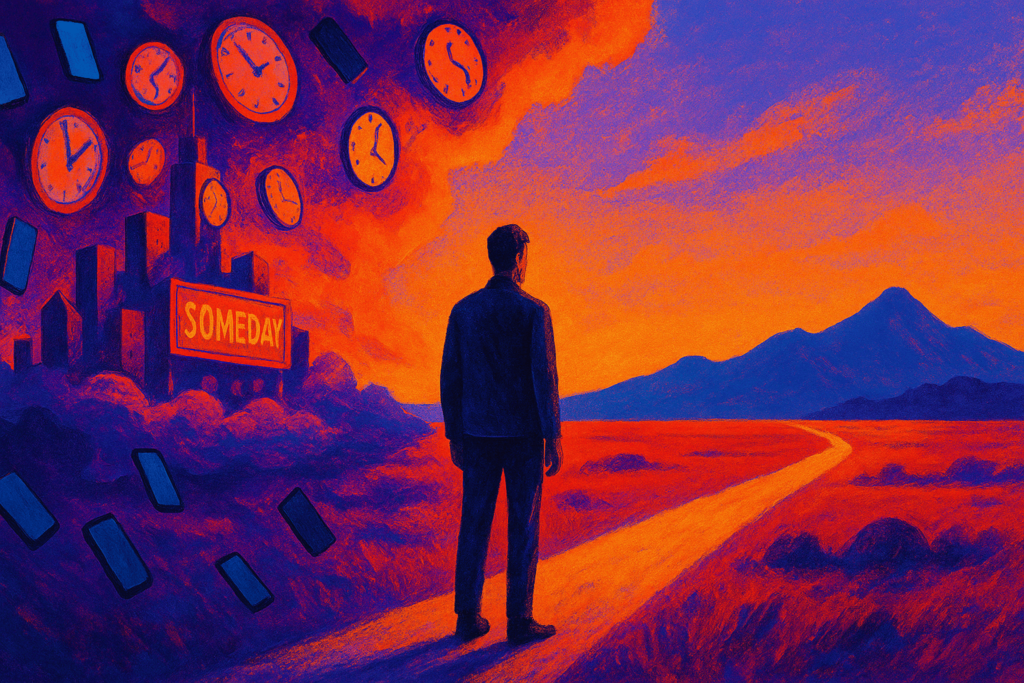There’s something strange about your 40s. You’re no longer young enough to be excused for flailing, nor old enough to claim the wisdom of age as a shield. You’ve lived enough life to see patterns repeat, yet most of us are still holding onto pieces of ourselves that no longer fit—ideas, habits, illusions that once served us but have calcified into avoidance.
We tell ourselves we’re refining, pivoting, growing. But underneath it all, if we’re honest, much of what we’re doing is dodging reality.
Reality isn’t just the sum of facts in front of you. It’s the truth you know deep down but aren’t willing to say aloud. And at this stage of life, when the window to change is still open—but not indefinitely—it’s worth asking: What am I still doing that’s stopping me from living in truth?
Let’s start with comfort. In your 40s, comfort becomes seductive. After two decades of grinding, hustling, striving, many people feel entitled to it. You’ve built something—maybe a career, a reputation, a family, or at least the illusion of stability.
You tell yourself you’ve earned the right to relax, to settle into the familiar. But what you call comfort may actually be stagnation. It’s one thing to rest; it’s another to let the rhythms of routine dull your instincts. If you’re still numbing yourself with the same nightly Netflix scroll, clinging to the same just-okay relationship, coasting at a job that stopped challenging you ten years ago—chances are, you’re avoiding a deeper confrontation.
Growth always begins with discomfort. And if you haven’t felt deeply uncomfortable in a while, you’re probably not growing.
Then there’s blame. It’s a quiet addiction in midlife. When we’re younger, it’s easy to pin failures on inexperience or lack of opportunity. But by 40, those excuses thin out. And yet, many people double down.
They blame the market, their parents, the government, their partner, or even “the algorithm.” It’s not that those factors don’t matter—they do. But when your default response to dissatisfaction is external, you trap yourself in a narrative of helplessness.
Ownership of your life doesn’t mean you caused everything; it means you respond to everything as if you are the one who will shift it. If you’re still operating from the belief that your best life is being withheld by something or someone out there, you’re not living in reality. You’re outsourcing your agency.
This leads us to another avoidance pattern: the fantasy of potential. There’s nothing wrong with having dreams, but in your 40s, clinging to unrealized potential becomes a subtle form of self-sabotage.
You may still be talking about the book you’ll write, the business you’ll launch, the passion project you’ll finally make time for—someday. But decades have passed, and you still haven’t done it. Why? Because keeping your potential hypothetical is safer than seeing what happens when you try and possibly fail.
It allows you to live in the illusion that your “real life” hasn’t started yet. But your real life is already here. If you’re still hanging onto the version of yourself you could be, at the expense of becoming the version you must be, you’re hiding in the shadow of your own possibility. That’s not ambition. That’s avoidance dressed up as hope.
Another red flag: performative self-help. We live in a culture saturated with life hacks, podcasts, coaching programs, cold plunges, journaling rituals, mushroom powders, and five-step morning routines. For many, these tools help build structure and clarity.
But if you’re in your 40s and still treating self-improvement as a never-ending project—one more retreat, one more workshop, one more “breakthrough”—you may be using growth as a decoy. The real question isn’t what you’re doing to improve yourself. It’s what you’re refusing to confront.
Are you still endlessly preparing, optimizing, tweaking—without ever making the actual leap that matters? Self-development should point you toward decisive action. If it doesn’t, it becomes a form of spiritual procrastination—productive in appearance, stagnant in result.
Let’s talk about relationships. By your 40s, the pattern is visible: who you attract, how it goes, where it ends. If you’re still chasing emotionally unavailable partners, still confusing intensity with intimacy, still believing the right person will “fix” your loneliness—you’re not seeing your own role in the pattern.
You’re re-playing the same emotional script because it’s familiar, not because it’s healthy. Or worse, you’re staying in a relationship that is flatlining emotionally, sexually, spiritually—but you’re afraid of the void that would open up if you left. So you rationalize. You focus on logistics, shared responsibilities, the comfort of companionship.
You tell yourself this is just what long-term love becomes. But that’s not always true. If you’re in a relationship that no longer inspires you to become more honest, more whole, more courageous—it may be time to question what you’re protecting. Is it the relationship—or your fear of starting over?
Work is another mirror. By now, you’ve likely climbed some ladder—corporate or otherwise. You may be respected in your field, even admired. But if you’re still measuring your worth by titles, income, external validation, or follower counts, you’re stuck in a framework that’s already outlived its usefulness.
Success in your 40s should feel different than in your 20s. It should be quieter, deeper, more aligned.
If you’re still working yourself into exhaustion to win approval from people you don’t respect or to maintain a lifestyle that doesn’t fulfill you, you’re avoiding the harder question: What is all this for? Are you still chasing because it’s meaningful—or because stopping would force you to sit with an inner emptiness you don’t want to acknowledge?
Then there’s distraction—the most socially accepted drug of avoidance. Doom-scrolling, casual sex without connection, alcohol, consumerism disguised as taste, “busyness” without purpose.
These things aren’t always harmful in themselves. But when you reach your 40s and still rely on distraction to avoid solitude, silence, or self-reflection, you’re not living—you’re buffering. The culture rewards distraction. It gives us infinite options to stay slightly numb, slightly amused, slightly productive. But reality asks more of you. It asks for depth. It asks you to feel things fully.
To grieve the life you thought you’d have. To forgive yourself for the mistakes you made. To stop and listen for the parts of yourself you’ve ignored for decades. That can’t happen when you’re constantly reaching for your phone.
None of this is about shame. The goal isn’t to feel bad for being here—it’s to notice that you are. Most people sleepwalk through these years, thinking they’re refining when they’re just repeating. You don’t have to throw your life into chaos to live more honestly. But you do have to stop pretending that tomorrow will look different without changing something today.
Facing reality in your 40s isn’t a single decision. It’s a series of small, unglamorous choices. Choosing solitude over distraction. Truth over comfort. Action over potential. Depth over performance.
It means giving up the fantasy that you’ll one day become who you’re meant to be—and recognizing that who you are right now is the raw material. That’s it. No more waiting. No more tweaking. Just you, here, in full view.
The strange gift of your 40s is this: the illusion of infinite time begins to crack, and through that crack, a kind of urgency seeps in. Not panic. Not fear. Just a deeper pull toward integrity. Toward realness. If you can follow that pull, even clumsily, even inconsistently, something profound starts to shift.
You stop living as a reaction and start living as a response. You stop chasing a version of yourself that only exists in your mind and start sculpting one that exists in your actions.
So if you find yourself still doing these seven things—clinging to comfort, blaming the world, fantasizing about your potential, endlessly “working on yourself,” avoiding hard truths in love, chasing external success, or staying constantly distracted—pause. Not to judge yourself. But to ask: What am I really avoiding? And what would it mean to finally stop?
You might discover that the life you want isn’t on the other side of more effort or more optimization. It’s on the other side of seeing clearly—then acting with courage.
And that, in the end, is what it means to grow up.
















